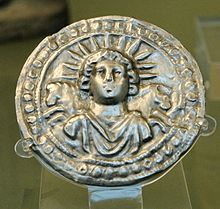Sol Invictus
Sol Invictus ("Matahari Tak Terkalahkan") adalah dewa matahari resmi pada masa Kekaisaran Romawi akhir. Pada tahun 274 kaisar Aurelianus menjadikannya sembahan resmi di antara sembahan tradisional Romawi lainnya. Para sejarawan berbeda pendapat mengenai apakah Sol Invictus merupakan pembentukan ulang dari dewa Romawi Sol,[1] atau kebangkitan kembali pemujaan dewa Elagabalus[2] atau memang dewa yang benar-benar baru.[3] Sol Invictus disukai oleh para kaisar setelah Aurelianus dan dewa itu muncul di koin-koin kekaisaran sampai masa kaisar Konstantinus.[4] Inskripsi terakhir mengenai Sol Invictus bertahun 387 M.[5] dan ada cukup banyak penyembahnya pada abad ke-5 sehingga Augustinus merasa perlu untuk menasehati mereka.[6] Festival untuk Sol Invictus diselenggarakan pada tanggal 25 Desember, yang kadang diduga sebagai asal mula tanggal natal.[7]

Catatan kaki
- ^ S.E.Hijmans, "The sun that did not rise in the east", Babesch 71 (1996) hlm.115-150
- ^ Gaston Halsberghe, "The cult of Sol Invictus", Leiden: Brill, 1972
- ^ As Hijmans states (hlm.115): "Scholars have consistently postulated a clear distinction between the Republican Sol Indiges and the Imperial Sol Invictus." dan hlm.116 "We should keep in mind, however, that most scholars agree that this cult[Sol Indiges] was never important, and that it had disappeared altogether by the beginning of the second century AD"
- ^ Halsberghe, "The cult of Sol Invictus", hlm.155: "Up to the conversion of Constantine the Great, the cult of Deus Sol Invictus received the full support of the emperors. The many coins showing the sun god that these emperors struck provide official evidence of this." and p.169 "the custom of representing Deus Sol Invictus on coins came to an end in AD 323."
- ^ Halsberghe, "The cult of Sol Invictus", hlm.170 n.3: "CIL VI, 1778, dates from AD 387."
- ^ Halsberghe, hlm.170, n.4: "Augustine, Sermones, XII; juga dalam Ennaratio in Psalmum XXV; Ennaratio II, 3."
- ^ Heim, "Solstice d'hiver, solstice d'ete", Latomus 59 (1999), hlm.640-660.
Referensi
- Berrens, Stephan (2004), Sonnenkult und Kaisertum von den Severern bis zu Constantin I. (193-337 n. Chr.), Geschichte (Franz Steiner Verlag); Historia (Wiesbaden, Germany) (dalam bahasa German), F. Steiner, ISBN 9783515085755
- Hijmans, S (2003), "Sol Invictus, the Winter Solstice, and the Origins of Christmas", Mouseion Calgary, 3.3: 377–398, ISSN 1496-9343, OCLC 202535001
- Hijmans, Steven E (2009), Sol : the sun in the art and religions of Rome (Thesis/dissertation), ISBN 9036739314
- Matern, Petra (2002), Helios und Sol : Kulte und Ikonographie des griechischen und römischen Sonnengottes (dalam bahasa German), Ege Yayınları, ISBN 9789758070534
Pranala luar
- Encyclopedia Britannica Online: Sol
- Probus and Sol, includes images of coins
- Roman-Emperors: Aurelian
- Gibbon's Decline and Fall: Triumph of Aurelian
- Gibbon's references for Aurelian's Temple of Sol Invictus
- Clement A. Miles, Christmas in Ritual and Tradition, Christian and Pagan (1912): December 25 and the Natalis Invicti
- Catholic Encyclopedia (1908): Christmas
- Ancient sources